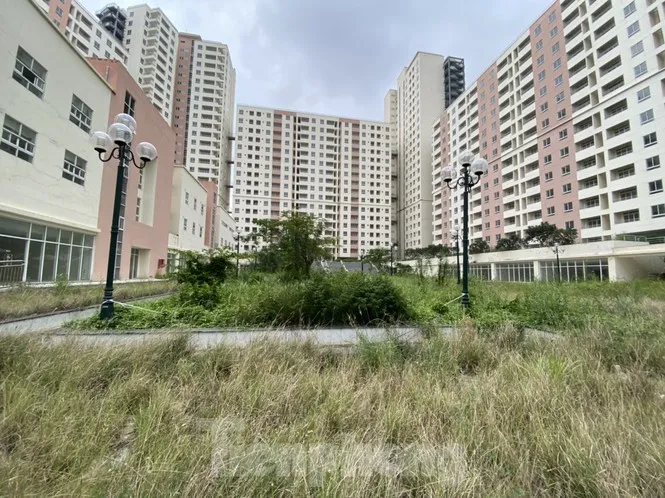
Each year, tens of billions of dong are being spent from the City budget for their maintenance and upkeep, which is proving to be a very wasteful expenditure.
Dilapidated buildings
Starting from one end of the Thu Thiem tunnel below the Saigon River and along Mai Chi Tho Avenue till District 2 is a stretch of about four kilometers. When looking towards the left, we can see tall unfinished blocks of apartment buildings. Few people actually venture to look inside these buildings. There is a vast empty space which is in contrast to the noise of cars driving up and down this avenue.
The deeper you go inside this empty space the more silence you encounter. The area is full of weeds and overgrown tall grass and the pavement tiles lie broken, blackened and covered in moss. Facilities that were once designed to serve would-be-residents such as lakes and gardens have deteriorated and only about ten security guards stand idly around the premises mainly to prevent drug addicts from misusing the deserted area for their purpose.
Although some commercial housing projects in this area are for sale for VND 60 mn to VND 70 mn per sq. m., if calculated at market price this real estate block is worth tens of thousands of billion dong. Letting these apartments lie vacant to rot will only deteriorate the property further and lower the value of real estate. According to the Center for Housing Management and Construction under the Department of Construction in Ho Chi Minh City, this unit is currently assigned to manage 9,434 apartments and more than 2,500 abandoned resettlement land areas. Nearly 4,800 units are up for auction while almost 2,000 units are awaiting resettlement for future projects. The Thu Thiem new urban area currently has about 5,300 vacant resettlement apartments over a 38.4 ha area in Binh Khanh in Thu Thiem.
The above situation shows that while many people have no place to live, thousands of land plots and nearly tens of thousands of apartments are lying abandoned for many years, causing tens of thousands of billions of dong to go waste, besides having to spend billions of dong annually to maintain these derelict apartments.
No clear solution
Mr. Huynh Thanh Khiet, deputy director of the Department of Construction, said the number of apartments in Thu Thiem new urban area have been auctioned twice, but without success. Mr. Khiet said that due to a large number of apartments, the City People's Committee had a policy to divide the number of apartments in upcoming auctions, and added that previous auctions were unsuccessful because the apartments with highly priced. Therefore, in the next auction, the number of apartments will be divided into small units which will be easier to sell.
Auctioning apartments in abandoned buildings of many years is not easy. According to many people’s opinion, in order to handle abandoned resettlement apartments, it is advisable to consider dividing them into smaller packages of five or ten units for small investors to buy, or auction each unit to persons in need of real housing. The demand for housing is very large, so if the resettlement apartments are sold at a reasonable price there will be many people looking to buy.
A representative of an investor based in District 3 said that very few big investors are interested in buying resettlement projects at auctions. The reason is that the building quality cannot be controlled, and as the need to balance purchase and sale price to ensure profitable sales in the future is important, a poor quality project will affect the investor's reputation. In addition, in order to auction, participating auction organizations ask for a deposit of thousands of billions of dong. This puts financial pressure to pay soon after the auction without any output.
The best way to resolve the problem of abandoned resettlement apartments is that the City directly sells to people who need a house, instead of selling a package to a large investor. When selling to people with real needs, the State will collect money immediately for the budget. Households who buy houses will also return to live in them immediately, so the area will quickly become residentially alive. However, for an investor to buy, he will first have to repair, renovate, then sell again, which all will take a lot of time.
According to real estate expert Tran Khanh Quang, the main reason why the recent auctions failed is due to financial problems. With a 20% deposit, the participating auction unit has to spend about VND 1,800 billion, and then three months later another deposit of nearly VND 7,000 billion, which all becomes very difficult for most real estate businesses today. According to Mr. Quang, in addition to the price issue, it is necessary to consider splitting the units so that the amount is deposited with ease, the payment is lighter with less pressure, and hopefully the next auction can be successful.
Mr. Le Hoang Chau, Chairman of the Ho Chi Minh City Real Estate Association, said that in addition to auctioning each resettlement housing block to big investors, the City should offer a third or a quarter of the apartments to people in real need of housing. However, in the long term, the resettlement policy will be implemented under three methods. These will be on-site resettlement, project resettlement and self-financing for new accommodation, in which on-site resettlement will be given priority. When applying all three methods, they will overcome the shortcomings of the current resettlement policy.




















